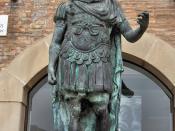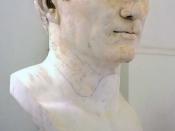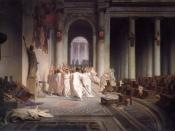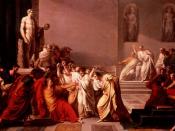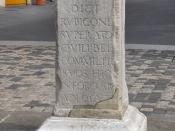Julius Caesar grew up to be a powerful politician and a military genius during the late Roman republic which led him to extend the Roman Empire and made him the dictator of Rome. Main influences that helped him stride to what he was are; Brutus, CaesarÃÂs good friend, Cleopatra, one of JuliusÃÂ mistresses, Pompey, once friends but now politics foes and son-in-law, and Cassius the primary schemer of JuliusÃÂ assassination. There were many accomplishments that Julius Caesar has done during his life to become a powerful politician gaining status and honor each war that he has been in such as; defeating Pompey during the RomeÃÂs civil war, conquering Gaul what is now modern France and Belgium, defeating Pharnaces II at the Battle of Zela and achieving dictator for life after PompeyÃÂs defeat. Marcus Junius Brutus was a Roman politician, JuliusÃÂ good friend and one of the prime conspirators of JuliusÃÂ assassination.
Somewhere around fifty-nine B.C., a man named Vettius has claimed that Brutus and several other men were in a group to murder Pompey. During this time the admired politician Julius Caesar was trying to liberate all the accusations of Brutus, since Caesar was currently having an affair with BrutusÃÂ Mother. When the civil war broke out between the two generals, Pompey and Julius Caesar, Brutus had fought against Caesar, but Caesar had forgiven Brutus for his actions; now Brutus is considered to be an acquaintance of Caesar. Caesar also sent Brutus to the East to make him governor of Cisalpine Gaul during forty-six to forty-five B.C.; no other man had been given the same privileges and respect as him (www.livius.org). During forty-four B.C. Caesar has been claimed dictator for life (www.roman-empire.net), Caesar was also offered the kingship but he refused knowing how Rome are not fond of kings. Even though Caesar refused the crown others knew he was trying to be king of Rome by how he had proclaimed himself and showed no reluctance to accept the status of dictator for life; these actions will lead to his demise. Brutus and more than sixty other conspirators came together; many of them were CaesarÃÂs close friends, the idea of dictator for life was against every democratic idea of the Republic. The conspirators decided to murder Caesar on March fifteen (Ides of March), when Caesar walked in a hall next to the theater of Pompey being seated on his gilded chair, a senator comes forward and held on CaesarÃÂs robe which was the signal to come and attack him. When Brutus stabbed him CaesarÃÂs last words were ÃÂYou too, my child?ÃÂ With no hope left Caesar hides his face with his robe to cover his wounds from the conspirators (www.dark-stories.com). Cleopatra and her brother, Ptlomey XIII were married at the time which was the customs of Egypt back then; ruling Egypt together, but eventually the marriage fell apart and Cleopatra was forced into exile. Civil war has broke out in Rome, somewhere around forty-eighty B.C., Pompey has fled to Egypt seeking shelter. When he arrived at Egypt Pompey tried to get acquainted with the Pharaoh Ptolemy XIII to help him battle against Julius Caesar but Ptolemy XIII knew that Caesar was coming to Egypt for Pompey, Ptolemy decapitated Pompey (www.mnsu.edu). Caesar enraged that a foreigner could kill a Roman, he immediately occupied Alexandria. Eager to take advantage of CaesarÃÂs anger with Ptolemy, Cleopatra returned to the palace in a Persian carpet to give herself as a present to Caesar; after it was unrolled Caesar was enchanted by her gesture. Nine months after their first meeting, Cleopatra gave birth to CaesarÃÂs son which he did not consider as his heir. (www.egyptologyonline.com). After PompeyÃÂs return in sixty-one B.C. the rivalry between Crassus and himself had risen, so to avoid a war, Julius Caesar arranged a peace treaty between the three (Triumvirate). After the treaty was signed, Pompey married Julia CaesarÃÂs daughter. The marriage managed the peace between the two, but after Julia passed away from child birth in fifty-four B.C., the two became immediate adversaries. Caesar went to Italy to gather his army, then returning to Rome starting the civil war. Caesar fought PompeyÃÂs army at Pharsala; even though PompeyÃÂs army was larger than CaesarÃÂs, Caesar had an army that was more experience which led to CaesarÃÂs victory, however Pompey has succeeded to escape to Egypt, where he will lead Caesar to one of his mistresses (www.mnsu.edu). After Pompey reached Egypt, he went to the Pharaoh to request aid to fend off Caesar and his army, however knowing that Caesar was arriving, he secretly decapitated Pompey and presented his head to Caesar. Caesar was enraged at the PharaohÃÂs actions of how a foreigner is allowed to kill a roman consul and his own son-in law. Ironically when Caesar was murdered by Brutus and more than sixty other senators, he collapsed beneath PompeyÃÂs statue (www.unrv.com). Gaius Cassius was a; Roman senator, philosopher, a conspirator of CaesarÃÂs assassination, and BrutusÃÂ half brother. Even though little was known of CassiusÃÂ early life, studies have found that he has been studying philosophy at Rhodes under his mentor Archelaus and became fluent with Greek (www.absoluteastronomy.com). Two years after his victory in Syria against the Parthians he returns home to Rome, where he finds a civil war between Caesar and Pompey. After his escape from Italy he finds Pompey in Greece and was made commander of his navy, then in 48 BC Cassius took a trip to Italy with his ships, burning and destroying CaesarÃÂs navy. After hearing PompeyÃÂs defeat, Cassius heads to King Pharnaces II anticipated for aid from the king, but unfortunately, Cassius bumps into Caesar on his route enforced to give in (dic.academic.ru). Caesar afterwards forgives Cassius and made him a general, using him for the Alexandrian War (dic.academic.ru). After two years with no political office seat Cassius was even more infuriated when his brother, Brutus received position of praetor urbanus (commander of an army). Now Cassius was busy directing his play of murdering Caesar, persuading the other senators to join in his scheme (www.absoluteastronomy.com). On the Ides of March CassiusÃÂ symphony was ready to begin, Tillius Cimber one of the senators stepped closer to Caesar as he sat down grabbing his shoulder as the signal for attack. The senators gather around him quickly unsheathing their dagger and rushed at him, Cassius made a slash on CaesarÃÂs face ending his reign as dictator (www.unrv.com). CaesarÃÂs men were greedy and rough soldiers, who were devoted to him because of his successes and his skills as a leader, enemies feared his tactics and strategy. Spending seven years in Gaul and Britain he made treaties with other tribes of Gaul to take down others. After 2 years of confrontation with Gaul and Britain, all of Gaul was conquered, from the Rhine River to the ocean had surrendered to Caesar (www.livius.org). The Battle of Zela was fought on 47 B.C. between Julius Caesar and Pharnaces II of Pontus, Pharnaces was camped 3 miles away from the town of Zela what is now a small town in the Tokat province of northern Turkey (dic.academic.ru). A valley separated the positions of the 2 armies that were 5 miles apart. Pharnaces had an army of approximately twenty-thousand, which consisted mostly of tribal and inexperienced infantry, while CaesarÃÂs army were experienced and their leader was a genius when it comes to war (www.amazines.com). Caesar was so full of pride of his five day war with Pharnaces that he commemorated it and sent a letter home to Rome saying ÃÂVeni, vedi, veciÃÂ (I came, I saw, I conquered) (dic.academic.ru).
Julius Caesar a fierce politician and a military mastermind, his story was passed down from generation to generation of his great empire and his tragic downfall by his close friends and conspirators. Even though Caesar was though of as a manipulative man who wanted the power of a king in the eyes of some Romans, he has done many accomplishments which have also influence our lives such as us using the Julian calendar which have been reformed to the Gregorian calendar and some would consider JuliusÃÂ effects on tax reform, developing somewhat of a ÃÂfederalÃÂ tax. His death has inspired literature and the varying perspectives of morals, for an example Julius Caesar by William Shakespeare emphasizes on the downfall of this historical figure by the hands of friends and conspirators (www.britannica.com).
Work Cited Pagehttp://www.livius.org/bn-bz/brutus/brutus02.htmlhttp://www.roman-empire.net/republic/caesar-index.htmlhttp://www.dark-stories.com/eng/julius_caesar_beware_the_ides_of_march.htmhttp://www.mnsu.edu/emuseum/prehistory/egypt/history/people/pompey.htmlhttp://www.egyptologyonline.com/cleopatra.htmhttp://www.unrv.com/fall-republic/death-of-caesar.phphttp://www.absoluteastronomy.com/topics/Gaius_Cassius_Longinushttp://dic.academic.ru/dic.nsf/enwiki/47297http://www.britannica.com/EBchecked/topic/537853/William-Shakespeare/232326/Julius-Caesarhttp://www.livius.org/caa-can/caesar/caesar04.htmlhttp://dic.academic.ru/dic.nsf/enwiki/557775
